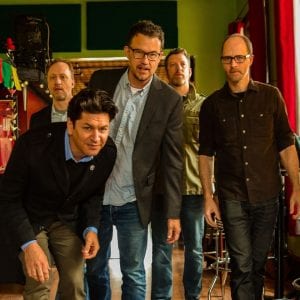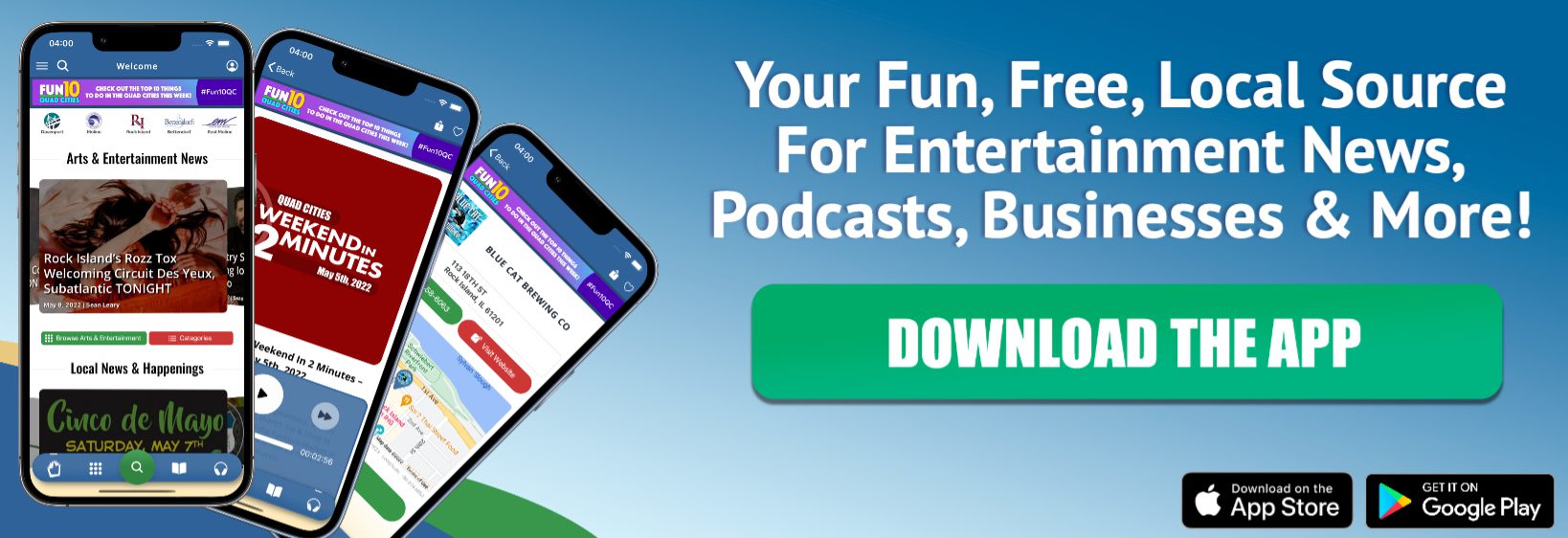Vinyl’s Resurgence No Surprise to Quad-Cities Record Experts
Saturday In The Arts is a weekly look at intriguing personalities and trends on the local arts scene, presented every Saturday morning, on your site for fun, free, local entertainment and features, QuadCities.com.
October 1978 was a heavenly time to be a Billy Joel fan. Just days before I got to see “The Piano Man” live for the first time (in Milwaukee), I bought his new record, “52nd Street” at the mall, and nearly floated all the way my walk home, devouring the lyrics on the back cover.
Despite the technological advances of CDs, MP3s, YouTube, and digital streaming services, many music buffs still prefer the retro revolution (literally) that is vinyl, and feel that same joy I did 42 years ago.
Even though streaming – such as Apple Music, Spotify and Pandora – represents the vast majority of how recorded music is consumed, sales of vinyl LPs have been growing consistently for 14 years, as CD sales were dropping three times as fast as vinyl grew last year, according to the Recording Association of America (RIAA).
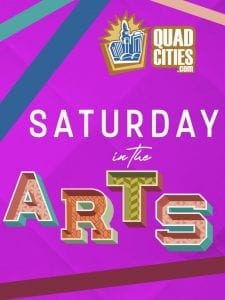 Vinyl sales represent just about 4.5 percent of the $11-billion American record business, but number of units sold has jumped from the nadir of under one million in 2006 to nearly 19 million in 2019.
Vinyl sales represent just about 4.5 percent of the $11-billion American record business, but number of units sold has jumped from the nadir of under one million in 2006 to nearly 19 million in 2019.
That’s light years from the LP’s heyday in the ‘70s, as over 525 million vinyl albums were sold in EACH of the years 1977 and 1978, before the digital revolution, according to RIAA. As demonstrates the medium’s nostalgia factor, 2019’s No. 1 vinyl seller was The Beatles’ “Abbey Road,” which marked its 50th anniversary last year.
Sales from streaming services represent 79 percent of all music sales, and the whole industry has grown almost $3 billion compared to 2017. RIAA chief exec Mitch Glazier said the year-end report showed people consume more music with every passing year, which seems more important and a source of comfort during this year’s shutdown period – especially artists have stopped touring.
In 2019, Americans alone streamed 1.5 trillion songs. As Glazier said, music is past the point of transitioning to digital — “it is leading a digital-first business.”
Greg Hipskind, director of QC Rock Academy and drummer for Wicked Liz and the Bellyswirls, said recently that he’s “not really one of those that does the vinyl thing. It’s so much easier for me to just stream or download. I wish I had more time to just sit and listen to albums but not really possible for me these days with kids and the business stuff and always on the go.
“My main way of listening is using iTunes and Apple Music, so sound quality is always solid,” he said. “I spend a lot of time in the car so that’s where I listen to most of my music. Never an issue with quality.”
I recently touched base with three other local music aficionados (two of whom make their living selling records) to take their temp on where the trend of vinyl is spinning. Here are their thoughts:
Shane Brown, Rock Island DJ and music junkie
A longtime local DJ for such diverse clubs as 2nd Ave, Stockade and Billy Bob’s, Brown is democratic in his music consumption, the owner of around 12,000 LPs, 18,000 CDs and about six terabytes of MP3s.

Shane Brown in front of a small fraction of his massive record collection.
“When CDs were introduced (in the early ‘80s), they were promised to be a HUGE step up in sound quality from vinyl. Truth be told, a lot of music sounds MUCH better on vinyl,” he said by e-mail recently. “Vinyl can have a broader dynamic range, and some records just sound warmer and wider than their CD counterparts. Also, if you start getting geeky about your stereo systems, some of the higher-end audio amplifiers are designed to respond better to analog signals than digital.”
“Vinyl is great because, like I said, you can get a warmer and more organic sound,” Brown wrote. “Plus, the whole listening experience is a little more immersive when you get to HOLD a record in your hands, put it on the stereo, and place the needle on the grooves.
“I like to OWN music, I like to hold it in my hand, enjoy the album art, read the liner notes, etc. Of course, the drawback of vinyl is that records can be a bit cumbersome and require great care to maintain a good collection – they can warp, they can get scratched, etc.,” he said. “Plus, you need a good turntable and those don’t come cheap. A good DJ turntable can set you back $2,000 easy.”
“CDs are great because the format is loss-less. It’s a digital file that can’t lose sound quality with a scratch or skip if you bump the needle,” Brown noted. “That’s not to say they can’t get damaged because you can scratch a CD and make it impossible for a laser to read. The cons? They’re slightly less personable than records, they’re still more cumbersome than MP3s, and the sound they produce often isn’t as warm or organic as a record.
“MP3s and streaming audio just suck,” he contended. “They’re convenient, that’s the ONLY advantage. You don’t have to carry them around, and with a smartphone or satellite radio, you can access MP3s and streaming music just about anywhere. But MP3s and streaming media suffers from dynamic compression – in order for that music to stream to your car radio or your smartphone, those files have to be compressed into a lossy format – you’re losing little bits of your song here or there, and you don’t even need sharp audiophile ears to hear the difference.
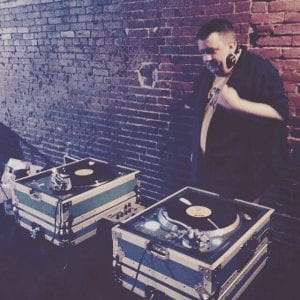
Shane Brown has been DJing at local clubs and raves for almost 30 years.
“Often, they’ll try to make up the difference by ‘remastering’ the file, which more often than not just means jacking the volume of the original track up and making it even LESS dynamic as a result,” Brown said. “Plus you lose all the fun in holding the music in your hands. You don’t get to feel the weight of the record, stare at the album cover, smell the musty cardboard sleeve, or study the liner notes, and that’s half the fun.”
Also, digital files are temporary. “Oops, my hard drive crashed — Sorry, buddy, you just lost your whole record collection,” he added. “That’s just too temporary for me. MP3s feel like I’m renting music instead of owning it.”
Brown said vinyl restores the pure joy of collecting music.
“The streaming generation won’t understand the wondrous triumph of a well-curated collection. They won’t know what it was like to drive to Chicago JUST to look for import records. To go to record shows and spend HOURS diving through stacks and stacks of records looking for gems,” he said.
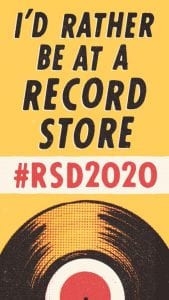
The Record Store Day 2020 logo
“They won’t know what it was like to drive to Muscatine through a snowstorm because it was the only local-ish record store whose orders weren’t delayed by the weather and you just HAD to have the new Depeche Mode CD on its release date,” Brown said. “Music collectors never went away; we’ve been collecting vinyl all this time. But now you’ve got a new generation that’s discovering how much fun of a hobby it is – and thankfully, artists are recognizing that, and putting out their stuff in 180-gram overweight vinyl (waaay better sounding), and thanks to events like Record Store Day, artists are putting out limited edition collectible titles on vinyl that are must-owns for hardcore fans. Even here in the QC, people line up for Record Store Day outside of Co-Op and Ragged at like 3-4 a.m. just to be first in line when the store opens at 10 a.m.”
He reluctantly has Spotify, but uses it as a sampler, and if he likes it, will buy on vinyl or CD. “And for that, it’s useful,” Brown said. “If I’m cruising around in the car and need something quick to listen to, it’s handy.”
“Spotify doesn’t have a lot of the bands I listen to, their discographies are often incomplete, etc. And worst of all, it’s a freaking insult that anyone with $9 a month or whatever it costs can instantly have 70% of the collection I wasted most of my teenage and adult life AND pretty much every cent of disposable income acquiring. Still, I’ll take my personal collection over Spotify ANY day.”

Shane Brown
For his DJ gigs, Brown does use MP3s, and the best controllers “replicate the touch, feel, and control of a turntable (which still tells you something about the viability of vinyl when the biggest technical achievement in DJing has been creating a digital controller that feels just like a record player),” he said.
“And when you’re blasting music out of a loudspeaker, you don’t hear the loss of the dynamic compression of digital formats as much as when you’re chilling in your bedroom with a pair of headphones on,” he added. “I still own DJ turntables and get them out frequently – during the shutdown, I recorded a 3-hour megamix of vintage ‘80s club tracks and had the BEST time hanging out in my basement, surrounded on all sides by vinyl – there’s worse ways to pass time in a pandemic.”
Reid Robinson, owner of Co-Op Records in Moline
A former record-store employee at Music Den at both the Moline and Davenport malls, Robinson has owned Co-Op on Avenue of the Cities for 25 years. Since the Covid-19 crisis, he re-opened the last Friday in May, and is open 10 a.m. to 9 p.m. Monday-Saturday.
He said recently his sales of vinyl (new and used) is nearly even compared to CDs, and is not limited to fans of a certain age.
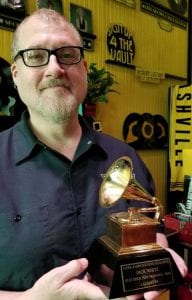
Reid Robinson holding a Jack White Grammy award at Third Man Records.
“As far as vinyl goes, as recently as eight, nine years ago, I could hardly give it away. It didn’t make any sense for me to afford space on the floor for records, when everybody wanted CDs and cassettes,” Robinson said. “For me, on a personal note, I love the fact that, I had extremely loyal customers coming in here when they were in high school, and now they’re coming in with their junior-high and high-school age kids. To see this generational thing happen, I’ve kind of grown up with these families.
“I love that about it – kids buying the same things their moms and dads bought 25 years ago,” he said. “Vinyl, to them it seems like a brand-new format. I think that alone, and the fact that it’s a tangible item. So much of what happens now is streaming and downloading, understandably so. It’s what they’ve grown up on.
“I think a lot of kids, especially if they have parents who were into music, are really starting to look at where the influences came from. I think, to a lot of kids I see coming in here, that’s very interesting to them,” Robinson said. “They’re soaking up the ‘70s. Right now, teenage girls, more than the guys, are really into the softer rock of the ‘70s.
“They’re 15 years old and they’re walking out with an armful of records that came out when I was a kid. That’s awesome to see,” he said, noting kids who are more serious about music are attracted to vinyl versus streaming.
“I see kids come in that now are exclusively buying on vinyl; it’s the only way they’re listening to music. That blows my mind in such a great way.”
The other day, four teens were in the store (members of their Rewards Club), and between them walked out with 22 brand-new sealed records. “For a lot of them, it’s like it was for me when I was a kid, I couldn’t get enough,” Robinson said.
Many record labels are playing catch-up, remastering and re-issuing a lot of old releases in the catalog that haven’t been available on vinyl for 30 years, he noted.
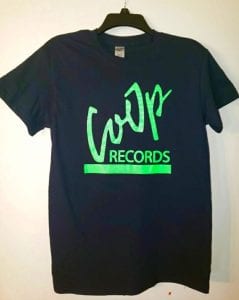 Originally, many customers wanted to replace their vinyl records on CD, and now it’s kind of going the opposite way. “They want to get it again on vinyl, absolutely,” Robinson said.
Originally, many customers wanted to replace their vinyl records on CD, and now it’s kind of going the opposite way. “They want to get it again on vinyl, absolutely,” Robinson said.
Co-Op buys and sells used LPs and CDs, and many people regret taking care of their vinyl. “I get that. There are so many people that say that. You played records; that’s the most important part,” he said.
“I know a lot of younger buyers, buying the reissued vinyl, they’re finding it fascinating if they find a poster inside, or they see the vinyl is not black, but orange. It’s a bit of a surprise to them, all the bells and whistles that go with vinyl, that don’t come with streaming,” he said.
Plenty of loyal buyers out there just never stopped buying vinyl. “They want to hold it in their hands; they want to touch it. They want to open it and hopefully be surprised there’s a little perk in there.”
A frequent new feature is a card for a free digital download of the album as well, which basically is “giving the option of two different formats, and only buying one,” Robinson said.
“When vinyl first started coming back around, what I heard time and time again is, we don’t want the music industry to tell us how to listen to music,” he said. “Right now, they’re kinda telling us, you got to do it on your computer or on your phone. So, that helped CD sales at that time as well, because it was a physical property.
“So much of the resurgence has to do with the fact that it does come off as a new medium to the new listener. And just that kind of discovery.”
“It is a movement. I never expected the female audience to step up the way they have with vinyl buying, because it has been for the most part, been a boys’ club. Teen girls specifically, what I hear time and time again, we sell these turntables that are portable, in a briefcase, with built-in speakers – they have become huge on college campuses. You can just pick it up, go to your friend’s dorm room and have a record party. That has been a really big thing too, keeping it a little more mobile that way.”
“To say I’m surprised is a huge understatement,” Robinson said. “I certainly never saw things coming back around the way they did. To me, it’s great because I get to re-live those glory days. I get to live in the ‘80s again.”
New vinyl averages $20-$25 each, compared to $13-$15 for CDs. Their used records go for $1-$5.
And quality control for LPs is much better than it used to be, he noted. “When vinyl was at its lowest point, quality control went out the window.
“Generally, they go through and do a remastering, which costs them money. I think new vinyl is over-priced. I would love for there to not be a new record for over $20 in my shop.”
Including everything Co-Op sells (such as clothing, posters and other merchandise), probably 40 percent is vinyl, and growing, Robinson said.
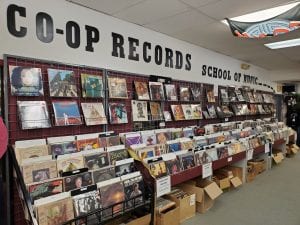
The CoOp Records Moline vinyl wall
Current artists who have championed vinyl include Jack White of The White Stripes, who has been a Record Store Day ambassador. “He has been responsible for so much interest in the vinyl industry now,” Robinson said. “He showed you could do all sorts of oddball things on vinyl that hadn’t been done before. He was showing holograms on vinyl, as they spin. He’s put bonus tracks beneath the label. He’s been such a champion for the medium and gotten lots of media recognition because of it.”
Record Store Day has been the third Saturday in April since 2008, to help promote the glory of vinyl nationwide, but of course, this year couldn’t happen then. It’s been rescheduled over three Saturdays – Aug. 29, Sept. 26, and Oct. 24.
It highlights new releases on vinyl and some old ones that are new to vinyl, or some with bonus tracks.
“The collectors come out like crazy that day,” Robinson said, noting many people will come to all three this year. “Without question, they’ve been my biggest day of the year.”
There’s also a smaller version of it on Black Friday, the day after Thanksgiving.
It’s not uncommon to have 150 people in line when they open the door at 9 a.m., he said. “It’s a feeding frenzy; it’s just chaos.”
As for CDs, Robinson said: “I love the convenience of CDs. From day one, I loved being able to track through, but there is a certain warmth that comes through with vinyl, on the proper stereo, that I feel can’t be found in a digital recording.”
Classical and old jazz he prefers to listen on CD, for that crispness and clarity. “Specifically rock, old blues and old country, that stuff, I like that warmth you get with vinyl.”
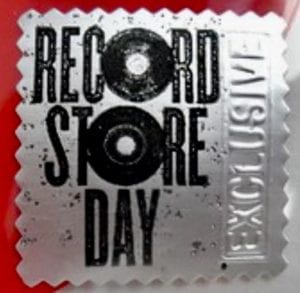
A Record Store Day Exclusive sticker, denoting an item released specifically for the special event
With CDs replacing some vinyl, “I even got to the point, listening to the CD didn’t feel right, because I had been listening to the vinyl so many years,” Robinson said. “I knew when there was a little crackle; I knew when I had to stop and turn it over.”
Compressed music (in a digital format) means it doesn’t have the chance to open and breathe, he noted. Neil Young didn’t ever want to record on digital format, only if it went from analog cassette, transferring to CD, Robinson said. “He felt that it could be more expansive, again just not quite that sterile environment, that doesn’t lend itself to specific records.”
Even with digital dominating the market, artists don’t get paid nearly as much compared to physical copies. “If I sell one record, the amount of money that goes back to the artist is so much more; you have to download a song 3,000 times to make a quarter,” he said. “It’s crazy, shameful, in my opinion – that an artist works so hard and that’s all they get out of it.”
A piece last September at visualcapitalist.com showed there’s a variety in artist revenue even for streaming. For example, the number of streams it takes for labels and artists to earn $1 ranges from 136 streams on Apple, 147 on Google Play and 229 on Spotify, to 752 for Pandora and 1,449 for YouTube.
Buying the actual record supports the artist more, Robinson said, while performers make most of their money on tour, and they can’t tour now. “Regardless of how they record, what the format is, that will never, ever be able to compensate for them not being able to get on the road, to perform, and the merchandise,” he said.
“The artists are probably seeing an uptick now. Being a musician has been an incredibly difficult thing to make a career of, ever, but now when they don’t even have the option of doing it the past few months,” Robinson said, noting one of hios employees is in a band, and they can’t even get together to practice.
“It sucks, because I know so many of those people, given what I do, and I just feel so bad for ‘em, you know?”
Co-Op also carries many local artists, some of whom release on vinyl, including Tripmaster Monkey and Einstein’s Sister. “Anybody who’s producing right now, I guarantee, they’re looking into pressing on vinyl,” Robinson said. “It’s way more expensive to do, but they know that’s where a chunk of the market is. Hopefully they can afford it.”
Bob Herington, owner of Ragged Records in Davenport and Rock Island
Though Herington may be thrilled to see vinyl’s resurgence, he’s had a very tough past 14 months, since his main store in downtown Davenport has been closed for over a year, since the record-breaking flood of last spring.
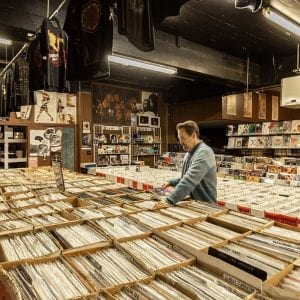
Bob Herington at Ragged Records
He and his business neighbor Trash Can Annie’s are moving just a block, across the street, from 418 E. 2nd St., to 311 E. 2nd, the former home of Dress for Success.
Ragged – which opened in 2008 – will reopen this fall, ideally by October, and fortunately (for future flooding) three and a half feet higher off street level than the old location.
Herington previously owned three Co-Op Records in central Illinois, and opened a new Ragged Records store at 311 1/2 21st St., Rock Island, in September 2018. He started curbside pickup in Rock Island a couple weeks ago, every Friday and Saturday. (Call 309-788-0898 between 1 and 4 p.m. to place your order and then pick up between 5 and 6 p.m.)
It’s smaller than Davenport’s old store, and more difficult to have social distancing in that space. If they start reopening with 50-percent capacity, that may limit him to five people at a time.
Ragged has become a favorite haunt for touring bands, with its close proximity to I-80, coming in to browse the big stock of LPs, 45s, CDs and DVDs – new and used (but only new CDs) — plus music paraphernalia including promo and vintage concert posters. The Rock Island store includes a selection of musical accessories, effects pedals, used guitars, amplifiers and more.
One reason for the growing vinyl trend?
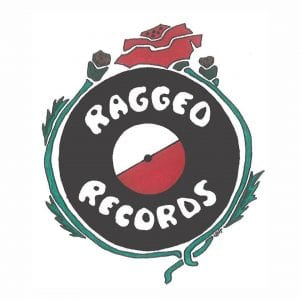 “It’s cooler. If you’re buying vinyl, you’re much cooler than if you’re buying CDs or have a streaming service,” Herington said. “Many reasons for the trend, he said. “I think people like holding something in their hands, something tangible. The larger artwork, the liner notes, and the cool factor.”
“It’s cooler. If you’re buying vinyl, you’re much cooler than if you’re buying CDs or have a streaming service,” Herington said. “Many reasons for the trend, he said. “I think people like holding something in their hands, something tangible. The larger artwork, the liner notes, and the cool factor.”
“It kind of never went away in the indie crowd, throughout the ‘90s and 2000s,” he said. “The smaller labels are still doing a lot of vinyl. You’ll hear a lot of people say vinyl sounds better than CDs. But that’s kind of the ‘ear of the beholder’ thing.
“People say it sounds warmer, the way vinyl’s pressed the bass response is a little muddier, so that’s what gives it that warmer sound. Streamed music or compact disc is compressed; you can get higher frequencies, but who can hear that but dogs anyway?”
“I kind of find CDs and streaming services have a tendency to wear you out, it’s taxing, because it’s so bright,” Herington said. “I think just to each his own; I don’t know one’s better than the other.”
“Records can sound completely different, depending on the system you’re playing it on, the quality of the system.”
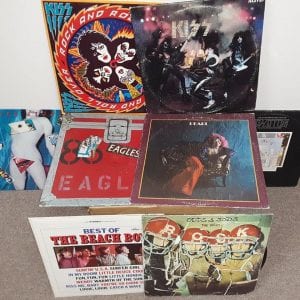
A selection of Ragged vinyl
He also sees a fairly even split of vinyl sales vs. CDs.
“For older people, it’s more a nostalgic thing, people going back to get records they got rid of when they bought CDs,” he said. “For young people, it’s kind of a cool factor.”
“That’s been part of this trend that’s been going on the past 10, 15 years, people are buying more the physical product, and wanting to be more supportive of the artist.”
“I personally don’t like listening to music on little earbuds, but I have friends who stream quite a bit and it’s like it was in the old days – you’d hear something on the radio and go, I want to buy that,” Herington said. “Now you can preview the entire thing now and decide if you want to buy a physical copy.”
Ragged is a doing special sale today (Saturday, June 20), in Rock Island in the green space between Rozz-Tox and their store, with Trash Can Annie’s, between 5 and 8 p.m. Ragged will sell $3 records, Trash Can Annie’s selling jewelry for $10, and there also will be Lopiez pizza and Rozz-Tox beverages available for purchase.
A release and refuge
As for me, I’m listening to Spotify as I type this, and honestly I don’t have a sound preference as to how I listen to music. I just love music so much, I’ll take it whenever I can. I can’t really recall the last time I played an LP or cassette, though I have a significant collection of each.
Spotify Premium (commercial-free) does spoil me, and I feel a bit guilty each time I add a song or album to my library. But it’s just so damn easy and convenient, and the lack of liner notes factor is made up (in a very small way) by the occasional use of “Genius Lyrics.” I don’t know who the Genius was who chose what few songs to attach commentary to, but I’ve been especially touched by the one you can read to Elvis Costello’s “Veronica” (1989).
It says it’s a hopeful pop song about Alzheimer’s disease, inspired by his grandmother, who lived with the illness in a nursing home. Despite the depressing nature of the disease, I love how upbeat and rocking the song is, as Costello tried to reflect on the woman’s happy memories, and how she used to laugh, “with a carefree mind of her own, with a devilish look in her eye.” He wanted the song to be defiant and triumphant, which it certainly is, so Alzheimer’s could not get the last laugh.
Spotify also has an interesting nugget about how Paul McCartney (who partnered with Costello on penning more than a dozen tunes, and plays bass on this one) really helped him with the bridge, which is noted as you’re listening to that part of the song.
No matter how you listen to music, it’s vital to pay for it in some fashion. And it’s more nourishing and needed than ever. Americans are showing pandemic fatigue and increasingly turning to music for cheer and self-improvement, according to the a recent installment of Nielsen Music/MRC Data’s survey series, “COVID-19: Tracking the Impact on the Entertainment Landscape.”
It’s an invaluable way to escape, reflect, and appreciate the genius of so many artists.



